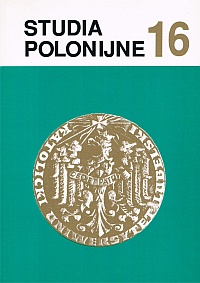On the Studies about the Religious Life of the Great Emigration
Main Article Content
Abstract
The Great Emigration evoked and still evokes great interest in historians. They have dealt so with politics, existence, culture, but hardly about religious life. The paper takes up this problem and shows the organization of the religious life of the Great Emigration in the first years after the Warsaw Uprising of November, 1830, was put down. The majority of refugees consisted of soldiers who went on their exile along with their chaplains. The latter organized in the camps, the so-called, "depot", religious life for their fellow exiles. We seek to answer the question how the chaplains solved the task by quoting what the participants of services and religious festivals said, and reports of the clergy, who ministered to them. Poles appealed to French bishops and received churches as their own or else they could use French churches at some appointed times, and Polish priests could say masses. We learn from diaries that at such masses took part the majority of the inhabitants of "depot". Today it is difficult to say to what extent their participation resulted from their deep faith and a need for spiritual experience, and to what extent it was owned to duty and willingness to have a festive parade. It seems that the latter was dominating, that is why an initiative was raised to revive religion and morals of the Great Emigration. A group of young people gathered around Bogdan Jański fell under this revival, and gradually were transformed from United Brothers into the congregation of the Resurrection who took sacerdotal vows.
The way people celebrated the more important church festivals in exile allowed the refugees to continue their family traditions, which they inherited from their country. To these traditions belonged e.g. Christmas celebrations: Christmas wafer sharing, Christmas Eve supper, New Year's celebrations, Easter customs (e.g. Easter egg blessed in church), and Corpus Christi. Homesickness accompanied emigrants throughout the period of their exile. It was their everyday bread, and grew intense at festive moments. Many of them then found relief in prayer. They resorted to it not only at church festivals, but also organized religious celebrations of the more important historical anniversaries. The main part of these celebrations was a mass. In like manner they prayed at each anniversary of Warsaw Uprising of November, 1830, and of the 3rd May Constitution. Anniversary celebrations in Paris were unlike those in the country.

